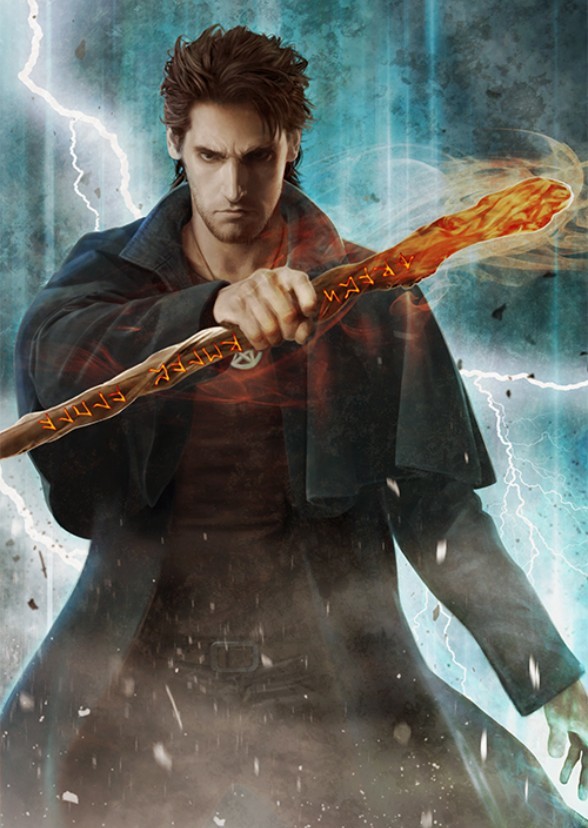Fantasy Saves
Pastor’s Epistle—February 2021
Fantasy helped me get through 2020.
Outside of our library book group, I’d gotten into the habit of reading mostly nonfiction: history, theology, folklore, that sort of thing. But over the course of the past year, as we’ve all struggled in our own ways to cope with the realities of covid-19, I found myself belatedly taking the advice of an old friend.
For nearly two decades, my old college roommate had been recommending to me a series entitled The Dresden Files, about a wizard eking out his living in modern day Chicago. It’s got religion, folklore, pop culture references—everything he knew I’d love. So at long last I picked up the first volume, and ended up reading through the entire series: 17 novels and two anthologies. To no-one’s surprise, my old roommate was right.
Then there was The Witcher, a bizarre little series of Polish fantasy novels written in the 1990s, just after the collapse of communism. My wife and I watched The Witcher television series on Netflix (having finally signed up for wifi, so that our children could engage in distance learning) and after that I picked up the books. They were a bit much, to be honest—some things must surely have been lost in translation—but they were also kind of fascinating. How often does one encounter a Slavic fantasy series offering a window into an Eastern European mindset from 30 years ago?
Then along came that staple of American nerd couture, Dungeons & Dragons. Despite my nerdy bona fides—I was into Star Wars and the Marvel Universe long before they were cool—my friends and I never got into D&D. I’m a late bloomer in that regard. For those unfamiliar, D&D is a system (or game) of collective storytelling, incorporating elements of fate, choice, and chance. It was cooked up by nerds such as myself, who wanted to play around in the worlds of their favorite books: Lord of the Rings, Conan the Barbarian, H.P. Lovecraft, that sort of thing. And now here I am in my 40s, eating it up.
Indeed, you might find yourself surprised at just how many of my clerical colleagues are into this sort of thing. And I think there’s good reason for that.
See, the funny thing about fantasy literature is that while it tends to be the periodic whipping boy of fundamentalists and American evangelicals, it is nonetheless an undeniably Christian genre. For all intents and purposes, fantasy as we know it was invented by George MacDonald, C.S. Lewis, and J.R.R. Tolkien—all devout and deeply thoughtful Christians, who used characters and creatures from folklore and pre-Christian mythologies to express their faith in Christ. J.K. Rowling, the most successful fantasy author of our times, once said that she avoided speaking publicly about her churchgoing for fear that it might spoil the ending to her Harry Potter series.
Some might well assume that the pleasure of fantasy is to be found in escapism: the chance to step away from the realities of pandemic, economic distress, unemployment, and political upheaval, which have so shaped and twisted the last year of our lives. And Tolkien might well agree with that, though with one firm caveat: fantasy is not intended as an escape from reality, but as an escape from spiritual prison into a deeper reality.
Tales of fantasy reveal to us the spiritual wonders which undergird, permeate, and exceed our perceptions of everyday reality. They show us heroism and hellishness, mythology and miracles, gods and monsters. To paraphrase G.K. Chesterton, fantasy doesn’t tell us that dragons exist—we already know that—but fantasy tells us that the dragons can be beaten.
In truth, this is not so far removed from the purpose of apocalyptic literature in our Scriptures. Whenever things go badly for the peoples of the Bible, they want to know why such terrible things are happening, what God is doing about it, and whether this calamity is in fact the end of the world. In such times of crisis and concern, prophets produce apocalypses.
Apocalyptic literature does two things. First, it assures us that there is an end, and a good one, planned for everyone and everything in this and every world, and that whatever we’re going through right now is not that end. Apocalypses give us hope in a brighter future, when evil shall be beaten, the dead raised from their graves, and God at the last shall be all in all.
Second, apocalyptic literature illustrates what God is doing here and now, beneath the surface and appearance of things. Political crises are interpreted spiritually. Worldly suffering is revealed as part of the great and cosmic drama of the salvation of humankind. In other words: what you’re going through matters.
And this is what fantasy can do today for us. It doesn’t deny reality; it shows us reality. It gives us hope and promises us a better tomorrow. It unveils the magic, the miracles, present in everyday life, if only we might look a little deeper. And it assures us that our sufferings, our stresses, our pains are not in vain, not ignored, but will in fact be redeemed as part of the universal drama of God’s remaking of our world.
I’m not saying we should all run out and get our nerd on (though I don’t imagine that would hurt). I’m just saying that you are known, you are loved, and God is with you. It may not always seem that way; it may be hard to discern meaning and purpose and value in all this muck and mess. But in the eyes of God, your life is nothing less than fantastic.
In Jesus. Amen.

Comments
Post a Comment